ACCG100 Accounting: NAB's Ethical Misconduct & Royal Commission
VerifiedAdded on 2023/04/19
|9
|1432
|138
Case Study
AI Summary
This case study critically evaluates the Royal Commission's recommendations regarding ethical misconduct in the banking sector, focusing on the National Australia Bank (NAB). It examines NAB's ethical failings related to home loans and introducer programs, highlighting the impact on shareholders, customers, and the government. The study identifies the causes of misconduct, including inadequate systems and incentive structures, and recommends changes in remuneration, oversight, and regulation. It also emphasizes the role of accounting and reporting in fostering ethical business conduct through transparency, integrity, and strong codes of conduct. The analysis concludes that ethical compliance is crucial for organizational success and requires fair reporting, documentation, and a commitment to ethical behavior.
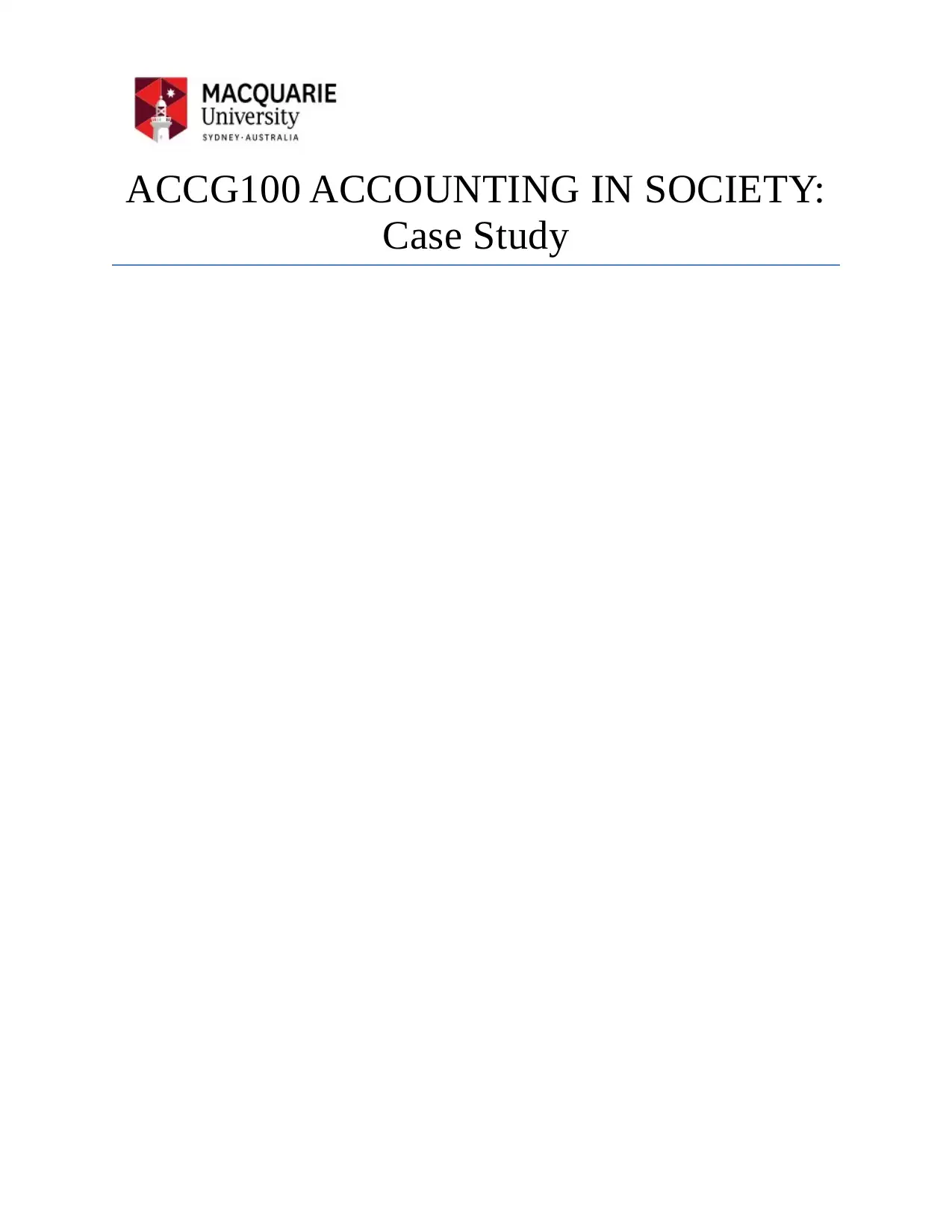
ACCG100 ACCOUNTING IN SOCIETY:
Case Study
Case Study
Paraphrase This Document
Need a fresh take? Get an instant paraphrase of this document with our AI Paraphraser
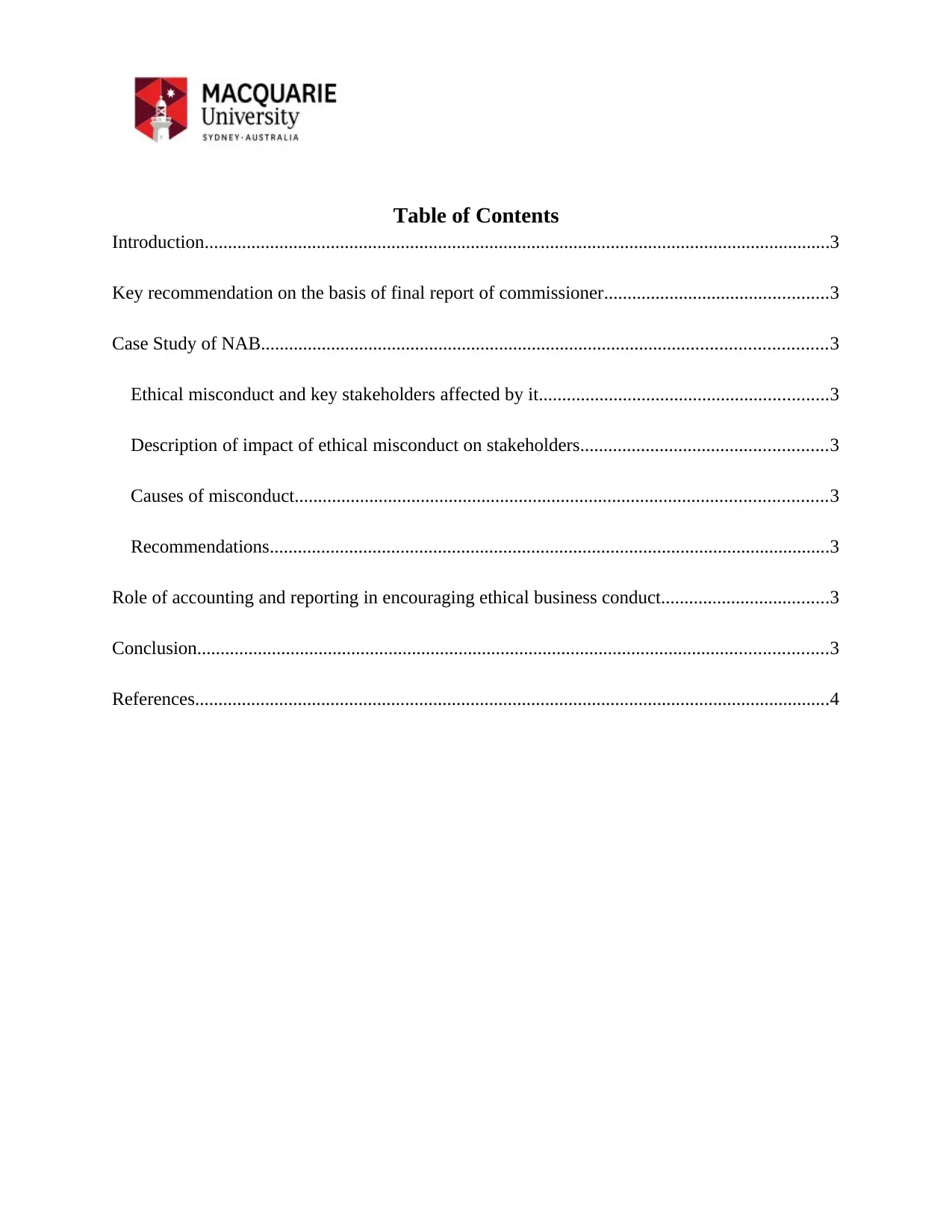
Table of Contents
Introduction......................................................................................................................................3
Key recommendation on the basis of final report of commissioner................................................3
Case Study of NAB.........................................................................................................................3
Ethical misconduct and key stakeholders affected by it..............................................................3
Description of impact of ethical misconduct on stakeholders.....................................................3
Causes of misconduct..................................................................................................................3
Recommendations........................................................................................................................3
Role of accounting and reporting in encouraging ethical business conduct....................................3
Conclusion.......................................................................................................................................3
References........................................................................................................................................4
Introduction......................................................................................................................................3
Key recommendation on the basis of final report of commissioner................................................3
Case Study of NAB.........................................................................................................................3
Ethical misconduct and key stakeholders affected by it..............................................................3
Description of impact of ethical misconduct on stakeholders.....................................................3
Causes of misconduct..................................................................................................................3
Recommendations........................................................................................................................3
Role of accounting and reporting in encouraging ethical business conduct....................................3
Conclusion.......................................................................................................................................3
References........................................................................................................................................4
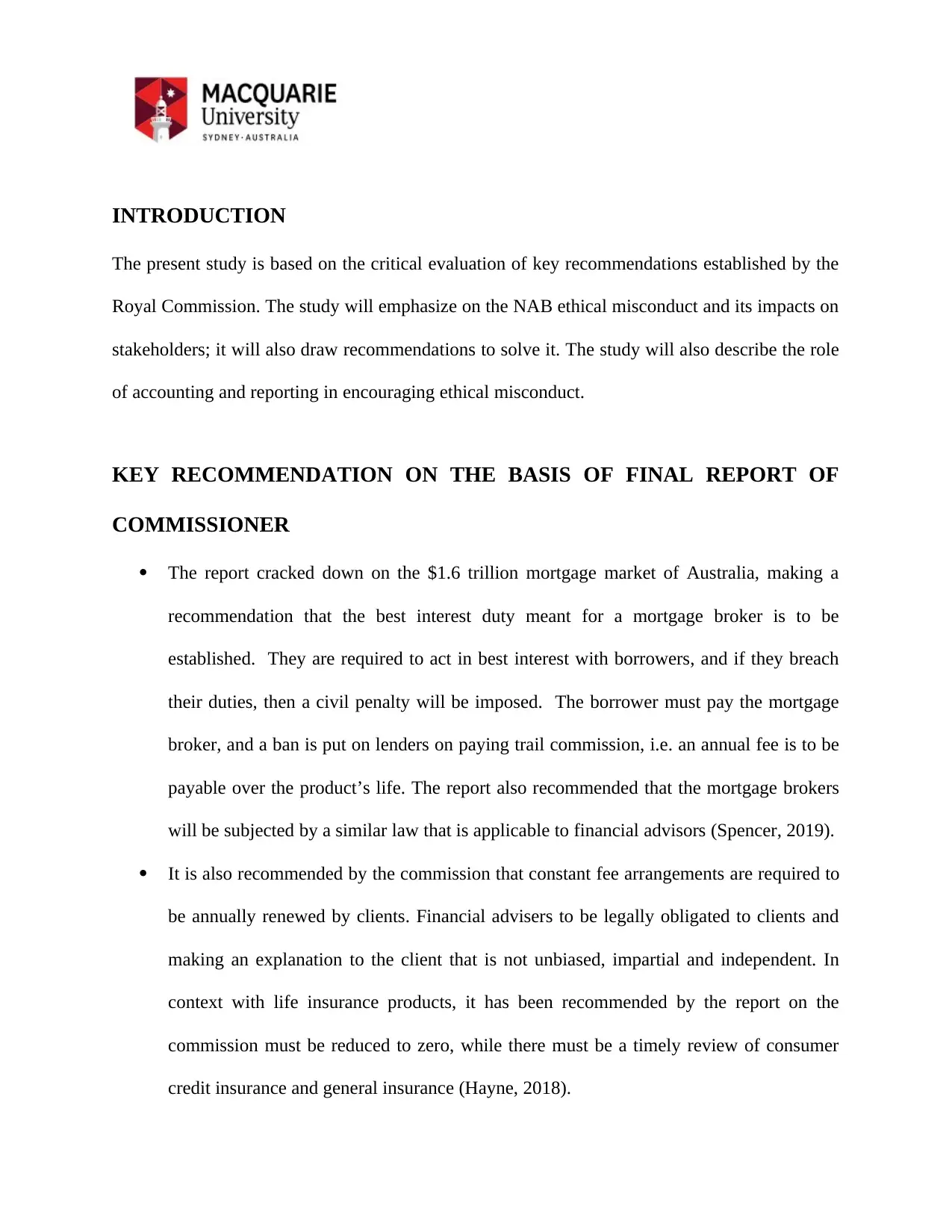
INTRODUCTION
The present study is based on the critical evaluation of key recommendations established by the
Royal Commission. The study will emphasize on the NAB ethical misconduct and its impacts on
stakeholders; it will also draw recommendations to solve it. The study will also describe the role
of accounting and reporting in encouraging ethical misconduct.
KEY RECOMMENDATION ON THE BASIS OF FINAL REPORT OF
COMMISSIONER
The report cracked down on the $1.6 trillion mortgage market of Australia, making a
recommendation that the best interest duty meant for a mortgage broker is to be
established. They are required to act in best interest with borrowers, and if they breach
their duties, then a civil penalty will be imposed. The borrower must pay the mortgage
broker, and a ban is put on lenders on paying trail commission, i.e. an annual fee is to be
payable over the product’s life. The report also recommended that the mortgage brokers
will be subjected by a similar law that is applicable to financial advisors (Spencer, 2019).
It is also recommended by the commission that constant fee arrangements are required to
be annually renewed by clients. Financial advisers to be legally obligated to clients and
making an explanation to the client that is not unbiased, impartial and independent. In
context with life insurance products, it has been recommended by the report on the
commission must be reduced to zero, while there must be a timely review of consumer
credit insurance and general insurance (Hayne, 2018).
The present study is based on the critical evaluation of key recommendations established by the
Royal Commission. The study will emphasize on the NAB ethical misconduct and its impacts on
stakeholders; it will also draw recommendations to solve it. The study will also describe the role
of accounting and reporting in encouraging ethical misconduct.
KEY RECOMMENDATION ON THE BASIS OF FINAL REPORT OF
COMMISSIONER
The report cracked down on the $1.6 trillion mortgage market of Australia, making a
recommendation that the best interest duty meant for a mortgage broker is to be
established. They are required to act in best interest with borrowers, and if they breach
their duties, then a civil penalty will be imposed. The borrower must pay the mortgage
broker, and a ban is put on lenders on paying trail commission, i.e. an annual fee is to be
payable over the product’s life. The report also recommended that the mortgage brokers
will be subjected by a similar law that is applicable to financial advisors (Spencer, 2019).
It is also recommended by the commission that constant fee arrangements are required to
be annually renewed by clients. Financial advisers to be legally obligated to clients and
making an explanation to the client that is not unbiased, impartial and independent. In
context with life insurance products, it has been recommended by the report on the
commission must be reduced to zero, while there must be a timely review of consumer
credit insurance and general insurance (Hayne, 2018).
⊘ This is a preview!⊘
Do you want full access?
Subscribe today to unlock all pages.

Trusted by 1+ million students worldwide
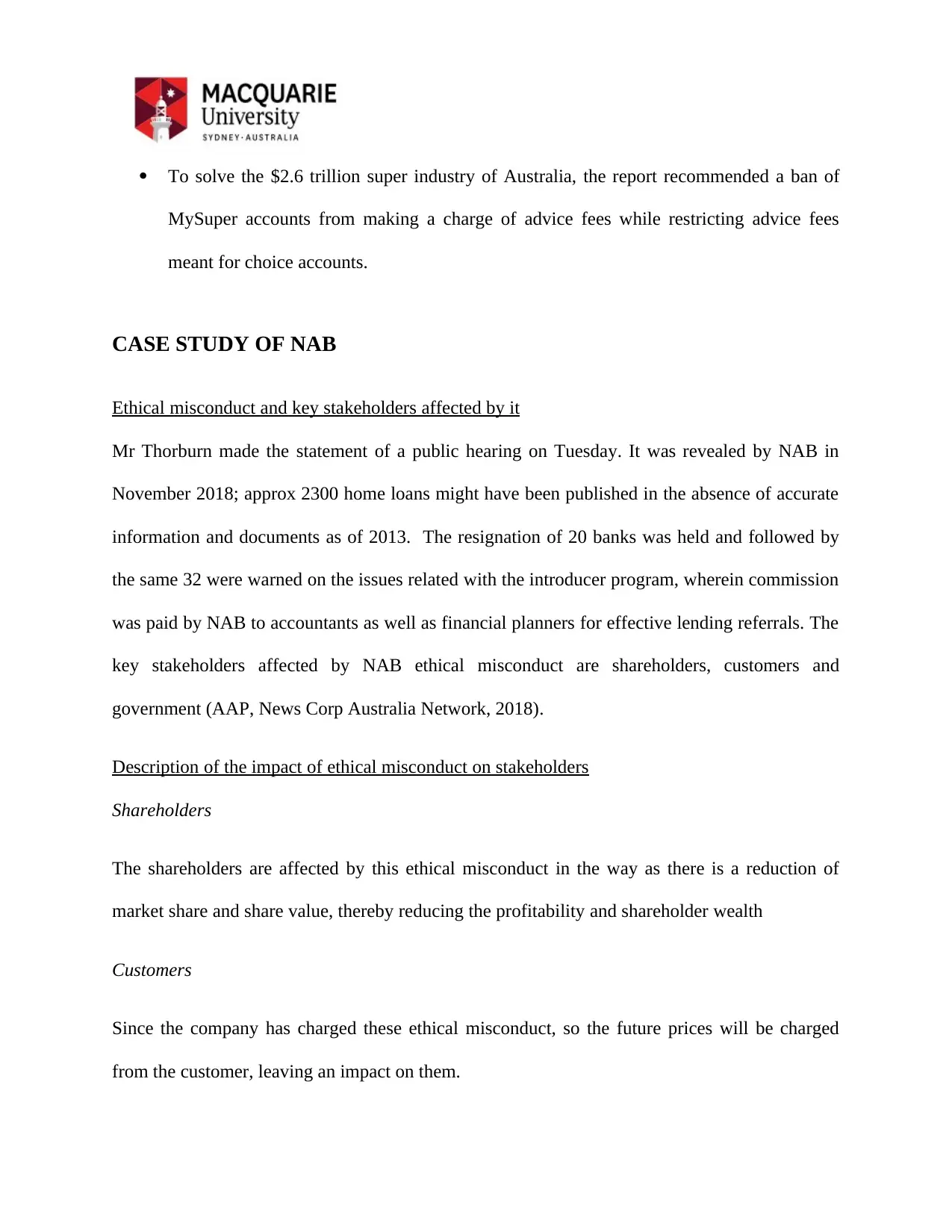
To solve the $2.6 trillion super industry of Australia, the report recommended a ban of
MySuper accounts from making a charge of advice fees while restricting advice fees
meant for choice accounts.
CASE STUDY OF NAB
Ethical misconduct and key stakeholders affected by it
Mr Thorburn made the statement of a public hearing on Tuesday. It was revealed by NAB in
November 2018; approx 2300 home loans might have been published in the absence of accurate
information and documents as of 2013. The resignation of 20 banks was held and followed by
the same 32 were warned on the issues related with the introducer program, wherein commission
was paid by NAB to accountants as well as financial planners for effective lending referrals. The
key stakeholders affected by NAB ethical misconduct are shareholders, customers and
government (AAP, News Corp Australia Network, 2018).
Description of the impact of ethical misconduct on stakeholders
Shareholders
The shareholders are affected by this ethical misconduct in the way as there is a reduction of
market share and share value, thereby reducing the profitability and shareholder wealth
Customers
Since the company has charged these ethical misconduct, so the future prices will be charged
from the customer, leaving an impact on them.
MySuper accounts from making a charge of advice fees while restricting advice fees
meant for choice accounts.
CASE STUDY OF NAB
Ethical misconduct and key stakeholders affected by it
Mr Thorburn made the statement of a public hearing on Tuesday. It was revealed by NAB in
November 2018; approx 2300 home loans might have been published in the absence of accurate
information and documents as of 2013. The resignation of 20 banks was held and followed by
the same 32 were warned on the issues related with the introducer program, wherein commission
was paid by NAB to accountants as well as financial planners for effective lending referrals. The
key stakeholders affected by NAB ethical misconduct are shareholders, customers and
government (AAP, News Corp Australia Network, 2018).
Description of the impact of ethical misconduct on stakeholders
Shareholders
The shareholders are affected by this ethical misconduct in the way as there is a reduction of
market share and share value, thereby reducing the profitability and shareholder wealth
Customers
Since the company has charged these ethical misconduct, so the future prices will be charged
from the customer, leaving an impact on them.
Paraphrase This Document
Need a fresh take? Get an instant paraphrase of this document with our AI Paraphraser
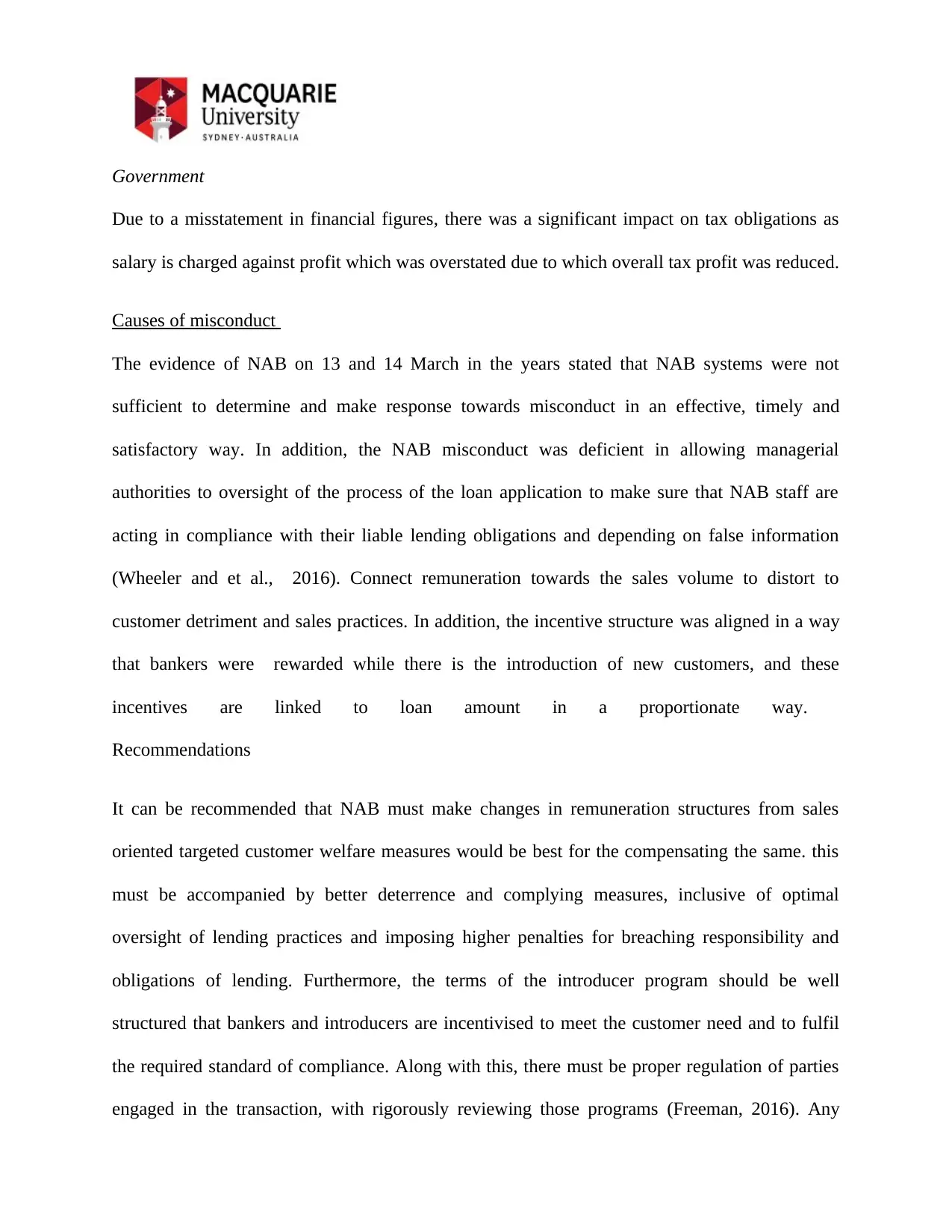
Government
Due to a misstatement in financial figures, there was a significant impact on tax obligations as
salary is charged against profit which was overstated due to which overall tax profit was reduced.
Causes of misconduct
The evidence of NAB on 13 and 14 March in the years stated that NAB systems were not
sufficient to determine and make response towards misconduct in an effective, timely and
satisfactory way. In addition, the NAB misconduct was deficient in allowing managerial
authorities to oversight of the process of the loan application to make sure that NAB staff are
acting in compliance with their liable lending obligations and depending on false information
(Wheeler and et al., 2016). Connect remuneration towards the sales volume to distort to
customer detriment and sales practices. In addition, the incentive structure was aligned in a way
that bankers were rewarded while there is the introduction of new customers, and these
incentives are linked to loan amount in a proportionate way.
Recommendations
It can be recommended that NAB must make changes in remuneration structures from sales
oriented targeted customer welfare measures would be best for the compensating the same. this
must be accompanied by better deterrence and complying measures, inclusive of optimal
oversight of lending practices and imposing higher penalties for breaching responsibility and
obligations of lending. Furthermore, the terms of the introducer program should be well
structured that bankers and introducers are incentivised to meet the customer need and to fulfil
the required standard of compliance. Along with this, there must be proper regulation of parties
engaged in the transaction, with rigorously reviewing those programs (Freeman, 2016). Any
Due to a misstatement in financial figures, there was a significant impact on tax obligations as
salary is charged against profit which was overstated due to which overall tax profit was reduced.
Causes of misconduct
The evidence of NAB on 13 and 14 March in the years stated that NAB systems were not
sufficient to determine and make response towards misconduct in an effective, timely and
satisfactory way. In addition, the NAB misconduct was deficient in allowing managerial
authorities to oversight of the process of the loan application to make sure that NAB staff are
acting in compliance with their liable lending obligations and depending on false information
(Wheeler and et al., 2016). Connect remuneration towards the sales volume to distort to
customer detriment and sales practices. In addition, the incentive structure was aligned in a way
that bankers were rewarded while there is the introduction of new customers, and these
incentives are linked to loan amount in a proportionate way.
Recommendations
It can be recommended that NAB must make changes in remuneration structures from sales
oriented targeted customer welfare measures would be best for the compensating the same. this
must be accompanied by better deterrence and complying measures, inclusive of optimal
oversight of lending practices and imposing higher penalties for breaching responsibility and
obligations of lending. Furthermore, the terms of the introducer program should be well
structured that bankers and introducers are incentivised to meet the customer need and to fulfil
the required standard of compliance. Along with this, there must be proper regulation of parties
engaged in the transaction, with rigorously reviewing those programs (Freeman, 2016). Any
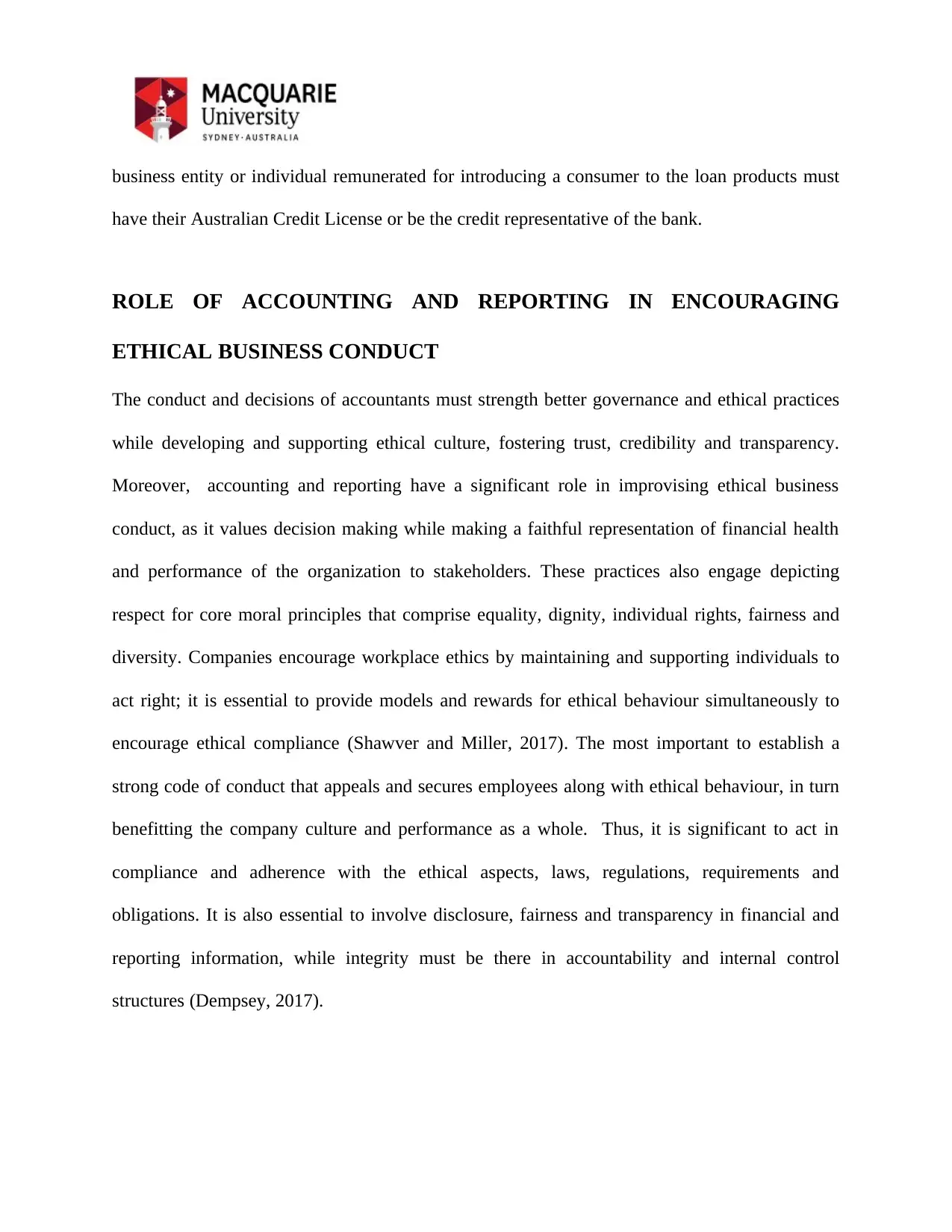
business entity or individual remunerated for introducing a consumer to the loan products must
have their Australian Credit License or be the credit representative of the bank.
ROLE OF ACCOUNTING AND REPORTING IN ENCOURAGING
ETHICAL BUSINESS CONDUCT
The conduct and decisions of accountants must strength better governance and ethical practices
while developing and supporting ethical culture, fostering trust, credibility and transparency.
Moreover, accounting and reporting have a significant role in improvising ethical business
conduct, as it values decision making while making a faithful representation of financial health
and performance of the organization to stakeholders. These practices also engage depicting
respect for core moral principles that comprise equality, dignity, individual rights, fairness and
diversity. Companies encourage workplace ethics by maintaining and supporting individuals to
act right; it is essential to provide models and rewards for ethical behaviour simultaneously to
encourage ethical compliance (Shawver and Miller, 2017). The most important to establish a
strong code of conduct that appeals and secures employees along with ethical behaviour, in turn
benefitting the company culture and performance as a whole. Thus, it is significant to act in
compliance and adherence with the ethical aspects, laws, regulations, requirements and
obligations. It is also essential to involve disclosure, fairness and transparency in financial and
reporting information, while integrity must be there in accountability and internal control
structures (Dempsey, 2017).
have their Australian Credit License or be the credit representative of the bank.
ROLE OF ACCOUNTING AND REPORTING IN ENCOURAGING
ETHICAL BUSINESS CONDUCT
The conduct and decisions of accountants must strength better governance and ethical practices
while developing and supporting ethical culture, fostering trust, credibility and transparency.
Moreover, accounting and reporting have a significant role in improvising ethical business
conduct, as it values decision making while making a faithful representation of financial health
and performance of the organization to stakeholders. These practices also engage depicting
respect for core moral principles that comprise equality, dignity, individual rights, fairness and
diversity. Companies encourage workplace ethics by maintaining and supporting individuals to
act right; it is essential to provide models and rewards for ethical behaviour simultaneously to
encourage ethical compliance (Shawver and Miller, 2017). The most important to establish a
strong code of conduct that appeals and secures employees along with ethical behaviour, in turn
benefitting the company culture and performance as a whole. Thus, it is significant to act in
compliance and adherence with the ethical aspects, laws, regulations, requirements and
obligations. It is also essential to involve disclosure, fairness and transparency in financial and
reporting information, while integrity must be there in accountability and internal control
structures (Dempsey, 2017).
⊘ This is a preview!⊘
Do you want full access?
Subscribe today to unlock all pages.

Trusted by 1+ million students worldwide
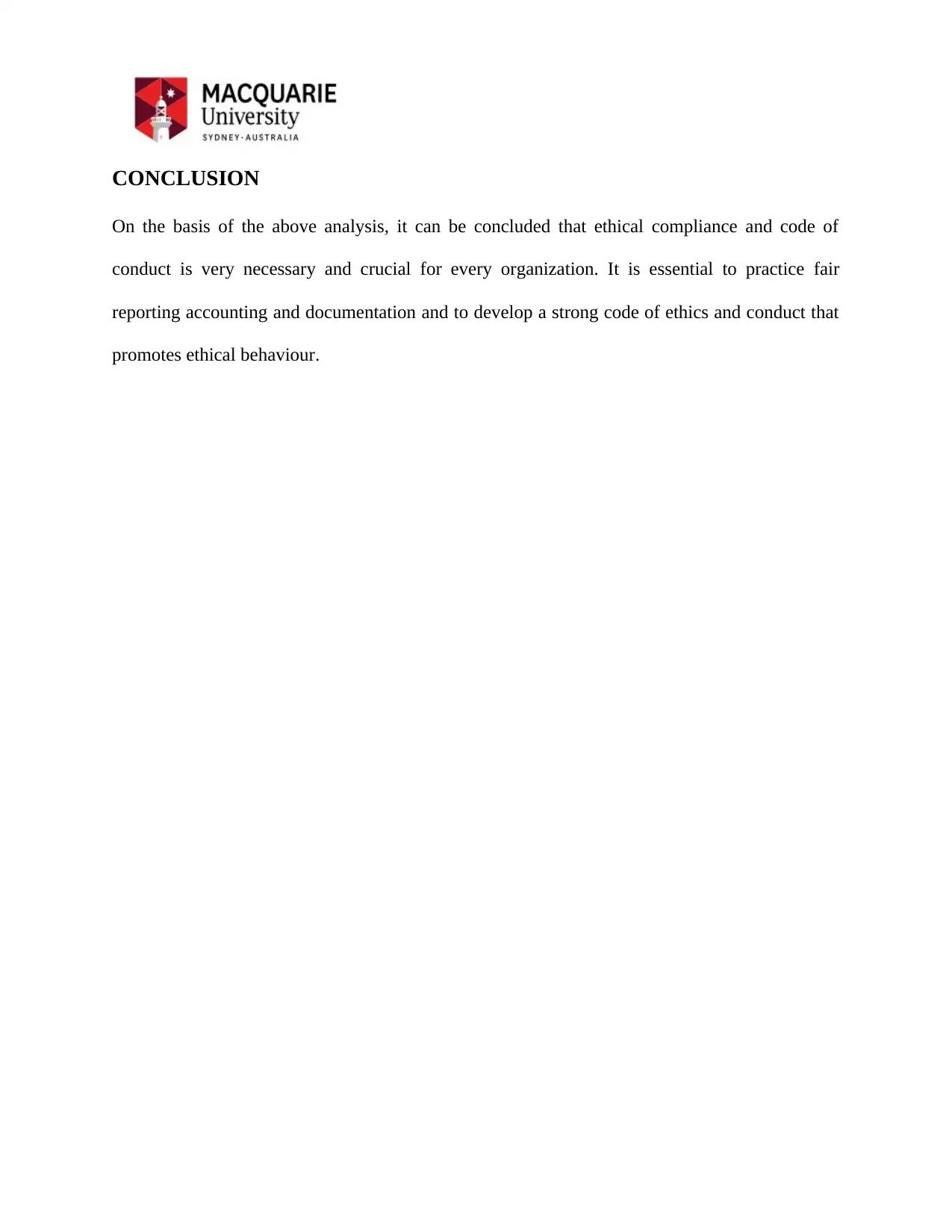
CONCLUSION
On the basis of the above analysis, it can be concluded that ethical compliance and code of
conduct is very necessary and crucial for every organization. It is essential to practice fair
reporting accounting and documentation and to develop a strong code of ethics and conduct that
promotes ethical behaviour.
On the basis of the above analysis, it can be concluded that ethical compliance and code of
conduct is very necessary and crucial for every organization. It is essential to practice fair
reporting accounting and documentation and to develop a strong code of ethics and conduct that
promotes ethical behaviour.
Paraphrase This Document
Need a fresh take? Get an instant paraphrase of this document with our AI Paraphraser
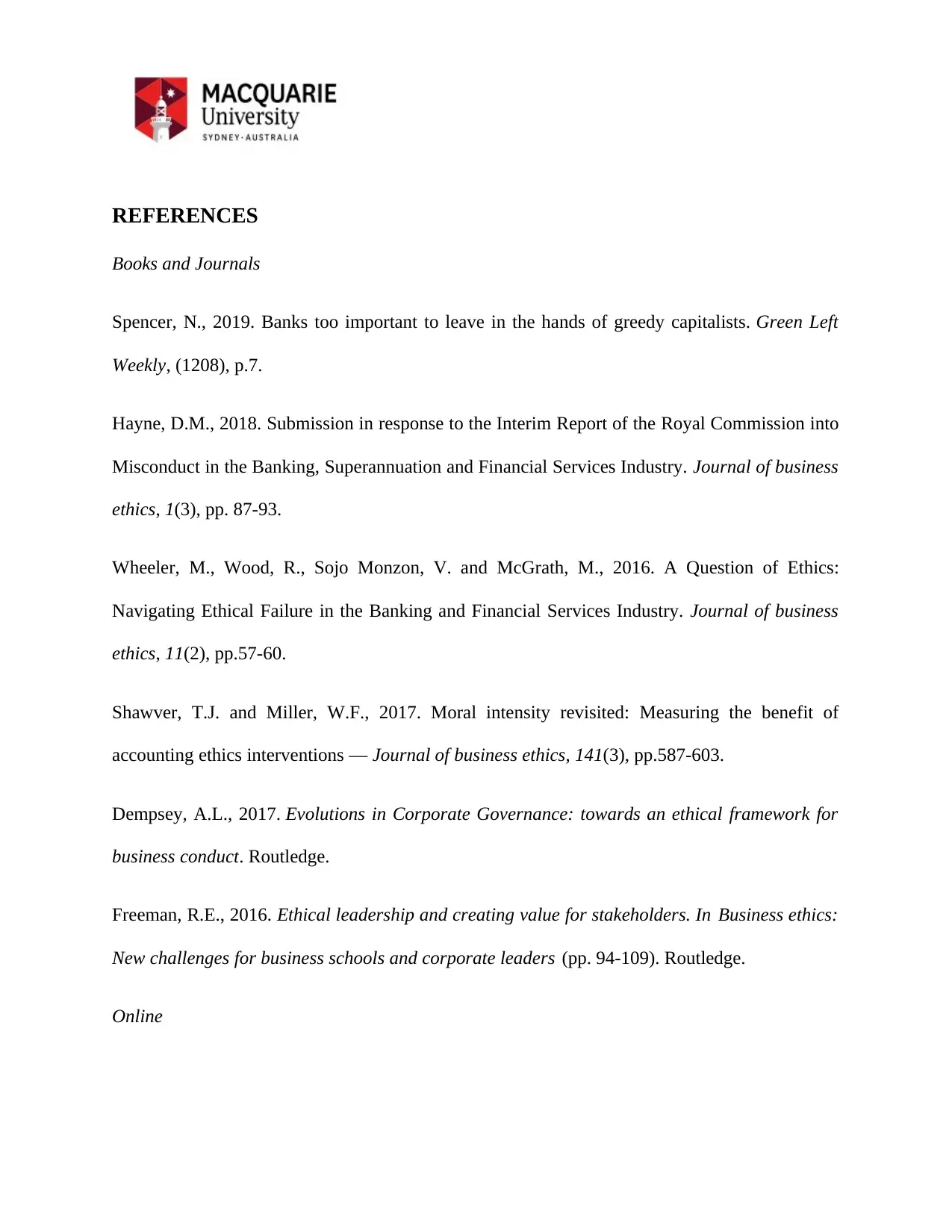
REFERENCES
Books and Journals
Spencer, N., 2019. Banks too important to leave in the hands of greedy capitalists. Green Left
Weekly, (1208), p.7.
Hayne, D.M., 2018. Submission in response to the Interim Report of the Royal Commission into
Misconduct in the Banking, Superannuation and Financial Services Industry. Journal of business
ethics, 1(3), pp. 87-93.
Wheeler, M., Wood, R., Sojo Monzon, V. and McGrath, M., 2016. A Question of Ethics:
Navigating Ethical Failure in the Banking and Financial Services Industry. Journal of business
ethics, 11(2), pp.57-60.
Shawver, T.J. and Miller, W.F., 2017. Moral intensity revisited: Measuring the benefit of
accounting ethics interventions — Journal of business ethics, 141(3), pp.587-603.
Dempsey, A.L., 2017. Evolutions in Corporate Governance: towards an ethical framework for
business conduct. Routledge.
Freeman, R.E., 2016. Ethical leadership and creating value for stakeholders. In Business ethics:
New challenges for business schools and corporate leaders (pp. 94-109). Routledge.
Online
Books and Journals
Spencer, N., 2019. Banks too important to leave in the hands of greedy capitalists. Green Left
Weekly, (1208), p.7.
Hayne, D.M., 2018. Submission in response to the Interim Report of the Royal Commission into
Misconduct in the Banking, Superannuation and Financial Services Industry. Journal of business
ethics, 1(3), pp. 87-93.
Wheeler, M., Wood, R., Sojo Monzon, V. and McGrath, M., 2016. A Question of Ethics:
Navigating Ethical Failure in the Banking and Financial Services Industry. Journal of business
ethics, 11(2), pp.57-60.
Shawver, T.J. and Miller, W.F., 2017. Moral intensity revisited: Measuring the benefit of
accounting ethics interventions — Journal of business ethics, 141(3), pp.587-603.
Dempsey, A.L., 2017. Evolutions in Corporate Governance: towards an ethical framework for
business conduct. Routledge.
Freeman, R.E., 2016. Ethical leadership and creating value for stakeholders. In Business ethics:
New challenges for business schools and corporate leaders (pp. 94-109). Routledge.
Online
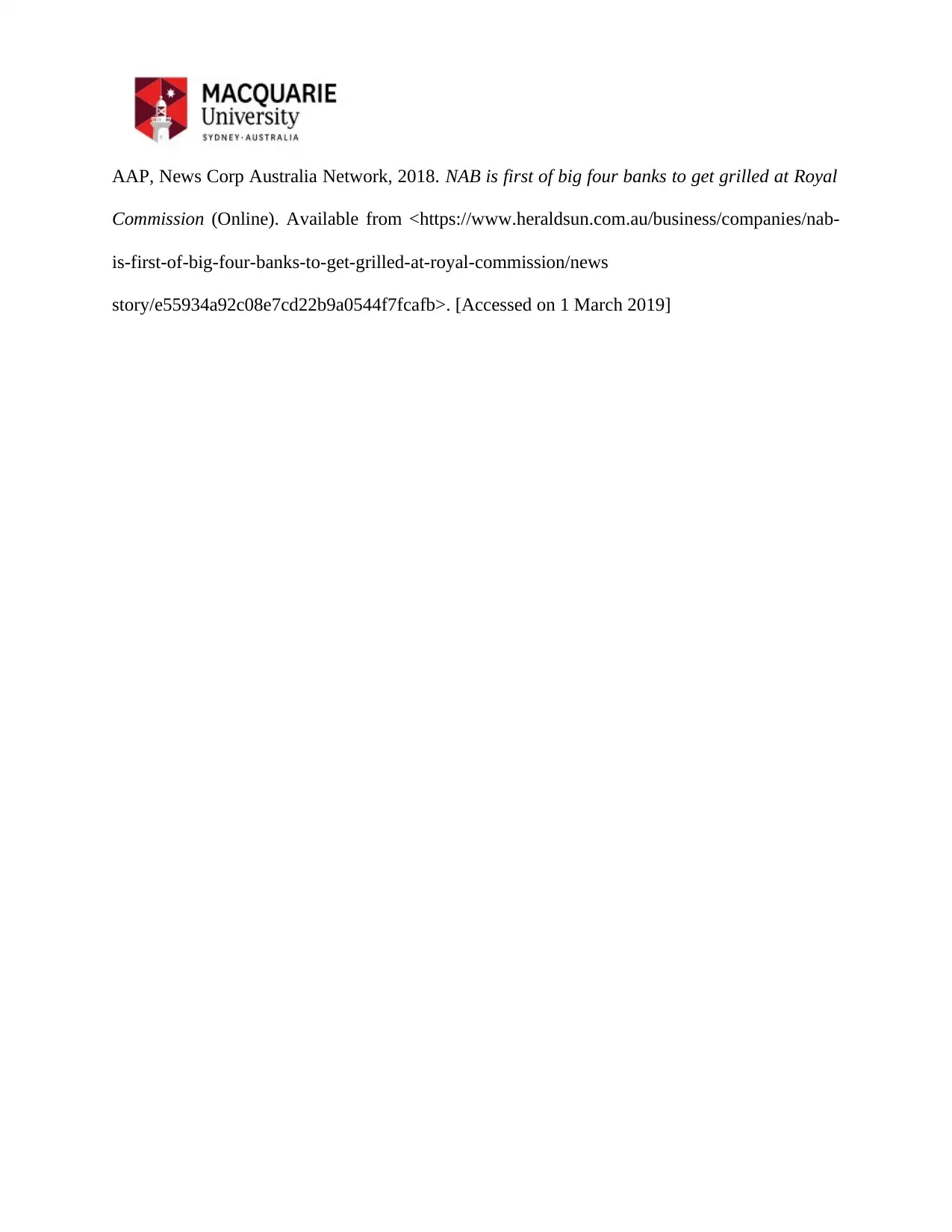
AAP, News Corp Australia Network, 2018. NAB is first of big four banks to get grilled at Royal
Commission (Online). Available from <https://www.heraldsun.com.au/business/companies/nab-
is-first-of-big-four-banks-to-get-grilled-at-royal-commission/news
story/e55934a92c08e7cd22b9a0544f7fcafb>. [Accessed on 1 March 2019]
Commission (Online). Available from <https://www.heraldsun.com.au/business/companies/nab-
is-first-of-big-four-banks-to-get-grilled-at-royal-commission/news
story/e55934a92c08e7cd22b9a0544f7fcafb>. [Accessed on 1 March 2019]
⊘ This is a preview!⊘
Do you want full access?
Subscribe today to unlock all pages.

Trusted by 1+ million students worldwide
1 out of 9
Related Documents
Your All-in-One AI-Powered Toolkit for Academic Success.
+13062052269
info@desklib.com
Available 24*7 on WhatsApp / Email
![[object Object]](/_next/static/media/star-bottom.7253800d.svg)
Unlock your academic potential
Copyright © 2020–2026 A2Z Services. All Rights Reserved. Developed and managed by ZUCOL.





